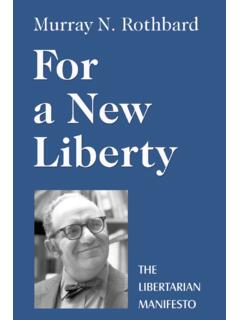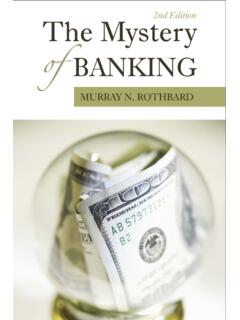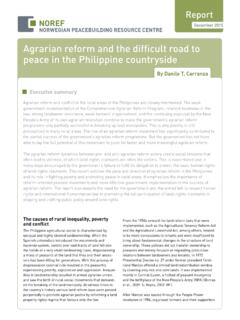Transcription of Road to Serfdom - Mises Institute
1 The road to Serfdomwith The Intellectuals and Socialism The road to Serfdomwith The Intellectuals and Socialism FRIEDRICH A. HAYEKthe condensed version of the road to Serfdom by f. a. hayek as it appeared in the april 1945 edition of reader s digestThe Institute of Economic Affairs5 This combined edition fi rst published in Great Britain in 2005 byThe Institute of Economic Affairs2 Lord North StreetWestminsterLondon SW1P 3 LBin association with Profi le Books LtdThis condensed version of The road to Serfdom was fi rst published in Great Britain in 1999 in the Rediscovered Riches series by The Institute of Economic Affairs, and reissued as Occasional Paper 122 in 2001 This condensed version of The road to Serfdom Reader s Digest, reproduced by kind permissionThe road to Serfdom is published in all territories outside the USA by Routledge. This version is published by kind permission. The Intellectuals and Socialism previously published in Great Britain in 1998 in the Rediscovered Riches series by the Institute of Economic Affairs The Intellectuals and Socialism The University of Chicago Law Review 1949.
2 Reproduced by kind other material copyright The Institute of Economic Affairs 2005 Every effort has been made to contact the copyright holders associated with this edition. The IEA will be pleased to include any corrections in future mission of the Institute of Economic Affairs is to improve public understanding of the fundamental institutions of a free society, with particular reference to the role of markets in solving economic and social moral right of the authors has been rights reserved. Without limiting the rights under copyright reserved above, no part of this publication may be reproduced, stored or introduced into a retrieval system, or transmitted, in any form or by any means (electronic, mechanical, photocopying, recording or otherwise), without the prior written permission of both the copyright owner and the publisher of this CIP catalogue record for this book is available from the British 0 255 36576 4 Many IEA publications are translated into languages other than English or are reprinted.
3 Permission to translate or to reprint should be sought from the Director General at the address in Stone by and bound in Great Britain by Hobbs the PrintersThe authors 7 Foreword by Walter E. Williams 10 THE road TO SERFDOMF oreword by Edwin J. Feulner Jr 19 Introduction: Hayek, Fisher and The road to Serfdom by John Blundell 22 Preface to the Reader s Digest condensed version of The road to Serfdom 34 Summary 35 The road to Serfdom (condensed version) 39 Planning and power 40 Background to danger 42 The liberal way of planning 45 The great utopia 47 Why the worst get on top 51 Planning vs.
4 The Rule of Law 57Is planning inevitable ? 59 Can planning free us from care? 61 Two kinds of security 66 Toward a better world 70 CONTENTS7 The road to Serfdom in cartoons 71 THE INTELLECTUALS AND SOCIALISMF oreword by Edwin J. Feulner Jr 93 Introduction: Hayek and the second-hand dealers in ideas by John Blundell 96 The Intellectuals and Socialism 105 About the IEA 130 Friedrich A. Hayek Friedrich A. Hayek (1899 1992) was born in Vienna and obtained two doctorates from the University of Vienna, in law and political economy.
5 He worked under Ludwig von Mises at the Austrian Institute for Business Cycle Research, and from 1929 to 1931 was a lecturer in economics at the University of Vienna. His fi rst book, Monetary Theory and the Trade Cycle, was published in 1929. In 1931 Hayek was made Tooke Professor of Economic Science and Statistics at the London School of Economics, and in 1950 he was appointed Professor of Social and Moral Sciences at the University of Chicago. In 1962 he was appointed Professor of Political Economy at the University of Freiburg, where he became Professor Emeritus in 1967. Hayek was elected a Fellow of the British Academy in 1944, and in 1947 he organised the conference in Switzerland which resulted in the creation of the Mont P lerin Society. He was awarded the Nobel Prize in Economics in 1974 and was created a Companion of Honour in 1984. In 1991 George Bush awarded Hayek the Presidential Medal of Freedom.
6 His books include The Pure Theory of Capital, 1941, The road to Serfdom , 1944, The Counter- revolution of Science, 1952, The Constitution of Liberty, 1960, Law, Legislation and Liberty, 1973 9, and The Fatal Conceit, AUTHORSthe road to Serfdom with the intellecuals and socialism89the authorsJohn Blundell John Blundell is Director General of the Institute of Economic Affairs. He was previously President of the Institute for Humane Studies at George Mason University and the Atlas Economic Research Foundation, founded by the late Sir Antony Fisher to establish sister organisations to the IEA. He serves on the boards of both organisations and is a former Vice President of the Mont P lerin J. Feulner Jr Edwin J. Feulner Jr has served as President of the Heritage Founda-tion since 1977. He is a past President of the Mont P lerin Society. He previously served in high-level positions in both the legislative and executive branches of the United States federal government.
7 He received his from the University of Edinburgh and was awarded the Presidential Citizen s Medal by Ronald Reagan in 1989 for being a leader of the conservative movement by building an organisation dedicated to ideas and their consequences .. Walter E. WilliamsWalter Williams is John M. Olin Distinguished Professor of Economics at George Mason University, Fairfax, Virginia. In addition, he serves as an Adjunct Professor of Economics at Grove City College in Grove City, Pennsylvania. He has also served on the faculties of Los Angeles City College, California State Univer-sity Los Angeles, and Temple University in Philadelphia. He is the author of over eighty publications that have appeared in schol-arly journals such as Economic Inquiry, American Economic Review, Georgia Law Review, Journal of Labor Economics and Social Science Quarterly, as well as popular publications such as Newsweek, The Freeman, National Review, Reader s Digest, Cato Journal and Policy Review.
8 Dr Williams serves on the boards of directors of Citizens for a Sound Economy, the Reason Foundation and the Hoover Institution, and on the advisory boards of the IEA, the Landmark Legal Foundation, the Alexis de Tocqueville Institute , the Cato Institute and others. He has frequently given expert testimony before Congressional committees on public policy issues ranging from labour policy to taxation and spending. He is a member of the Mont P lerin Society and the American Economic later expressed in the writings of British philosophers such as John Stuart Mill and David happened in Germany? Hayek explains, The supreme tragedy is still not seen that in Germany it was largely people of good will who, by their socialist policies, prepared the way for forces which stand for everything they detest . Hayek s explana-tion for the rise of Nazism was not understood and appreciated in 1944, and it is still not fully understood and appreciated today.
9 Collectivism, whether it is in Germany, the former Soviet Union, Britain or the USA, makes personal liberty its do we combat collectivism? Hayek provides some answers in The Intellectuals and Socialism. In a word or two, those who support the liberal social order must attack the intellectual foundations of collectivism. Hayek urges that an understanding of just what it is that leads many intellectuals toward socialism is vital. It is neither, according to Hayek, selfi sh interests nor evil intentions that motivate intellectuals towards socialism. On the contrary, they are motivated by mostly honest convictions and good intentions . Hayek adds that it is necessary to recognise that the typical intellectual is today more likely to be a socialist the more he is guided by good will and intelligence . Joseph A. Schumpeter differed, seeing Hayek s assessment as politeness to a fault.
10 2 Hayek argues that the roots of collectivism have nowhere orig-inated among working-class people. Its roots lie among intellec-tuals the people Hayek refers to as second-hand dealers in ideas who had to work long and hard to get working-class people to 2 J. Schumpeter, review of The road to Serfdom , Journal of Political Economy, June 1946: 269 A. Hayek was one of the twentieth century s greatest philosophers. While he is best known for his work in economics, he also made signifi cant contributions in political philosophy and law. The publication for which Professor Hayek is most widely known is The road to Serfdom , written during World War II, the condensed Reader s Digest version of which is presented here along with what might be seen as his follow-up, The Intellectuals and Socialism, fi rst published by the University of Chicago Law Review in focal point of The road to Serfdom was to offer an explana-tion for the rise of Nazism, to correct the popular and erroneous view that it was caused by a character defect of the German people.

















